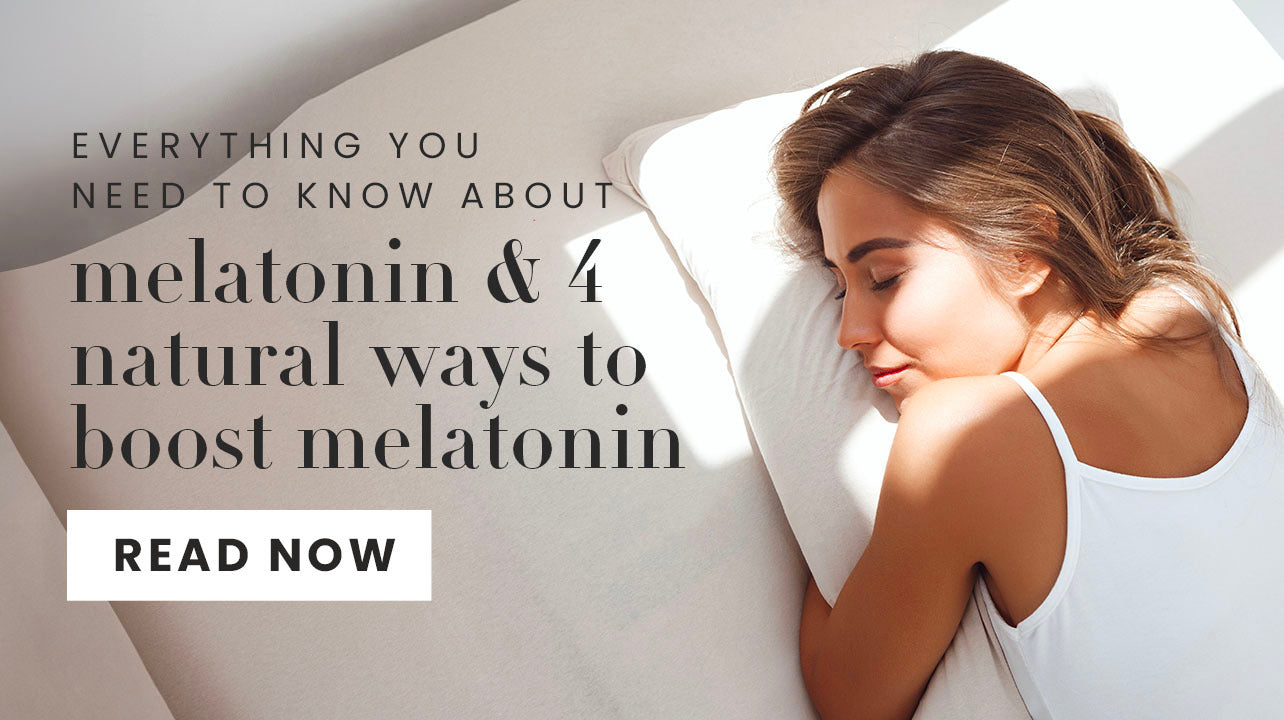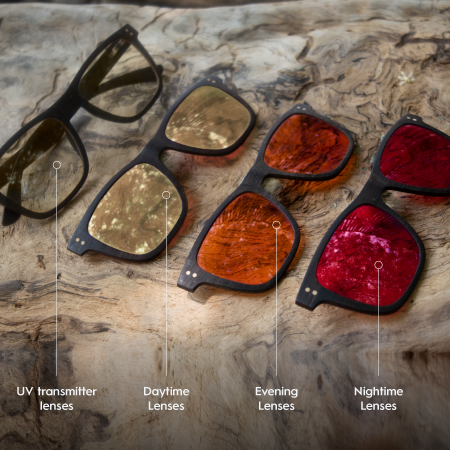Everything you need to know about melatonin & how to naturally boost your melatonin levels | VivaRays

In a world where the glow of screens outshines the stars, and the buzz of the city drowns out the natural rhythms of day and night, it's no wonder that sleep has become a luxury for many.
But what if the key to unlocking a better night's sleep and overall health lies within a tiny yet powerful hormone called melatonin?
Let's dive into the incredible world of melatonin👇
What is melatonin?
Melatonin is one of the most important hormones produced by our body. It is the most potent molecule that helps with regeneration, anti-cancer, anti-inflammation, antioxidant, and anti-aging. A single molecule of melatonin can clean up to ten inflammatory free radicals, which is much more effective than the most potent antioxidant from food, which can only clean two free radicals per molecule [1].
What stimulates melatonin production?
Melatonin is often referred to as the "hormone of darkness," but it's actually produced during the day.
Now, there are two ways in which your body produces melatonin:
1. Infrared light in sunlight:
The first way happens when infrared light (IR), present in sunlight but absent in artificial light, penetrates our skin and activates the production of melatonin inside our mitochondria.
This melatonin is produced locally in every cell's mitochondria and acts differently from the melatonin that we produce at night, known as the sleep hormone.
This type of melatonin has nothing to do with sleep. Its job is to clean off free radicals and inflammation inside the cell. Think of free radicals as the fumy oils coming out of a hot pan when you are preparing a meal in the kitchen. To cope with the mess, you turn on the exhaust. In our bodies, free radicals are the by-product of being alive.
When the mitochondria produce locally melatonin in response to sunlight, they become very efficient at turning on the exhaust and cleaning the metabolic mess that the cell produces in the form of free radicals. This helps your body to detoxify all the toxins that age your cells [2].
2. UV light:
The second mechanism happens when UV light (also absent in artificial light) hits our eyes, starting the production of circulatory melatonin in the pineal gland. This melatonin is then released after sunset when our light exposure starts slowly cascading down into complete darkness. However, most of us today in the modern world are facing two major problems.

What suppresses melatonin release?
1. Not enough natural light exposure during the day
The first problem is that most of us are not getting enough of these highly energized UVA photons in our eyes, which provide the energy for the natural conversion of the amino acid tryptophan, present in the eyes, into melatonin.
One study found that increasing exposure to natural light, especially in the morning, improved sleep quality and mood in older adults [3].
Another study found that just two hours of exposure to natural light during the day improved sleep quality and duration in patients with insomnia [4].
2. Lack of darkness at night
The second major problem is that our eyes are not getting the proper signal of darkness.
Today, we are bombarded with bright artificial lights long after the sun sets. This artificial light is emitted from our technology devices, LED lights in our homes, malls, and streets, and confuses our bodies into thinking it's still daytime, suppressing our melatonin levels by up to 95% [5].

This delayed shift in our internal clock can cause us to feel groggy and exhausted, with weak muscles, a foggy mind, and an upset stomach.
The Dangers of Melatonin Suppression
Not only does melatonin suppression destroy deep sleep, rejuvenation, and healing, but it also leads to the accumulation of toxins, faster aging of mitochondria, and a higher risk of chronic diseases.
One study found that exposure to bright light in the evening and at night significantly reduced melatonin levels, and disrupted sleep and circadian rhythms [6].
Why Relying on Melatonin Pills for Better Sleep May Not Be the Best Solution
Have you ever tried relying on melatonin pills to improve your sleep, only to wake up feeling groggy and unrested?
Well, it turns out that these pills might not be the magical solution they're cracked up to be.
Several studies suggest that melatonin supplements may not be as effective as they claim to be in improving sleep quality. [7]
Think of your body like a finely-tuned orchestra, with your sleep-wake cycle being the conductor. Just like how an orchestra needs practice to perform flawlessly, your body needs consistent exposure to morning sunlight and darkness to regulate your sleep-wake cycle.
Melatonin, the sleep hormone, is produced naturally in your body and plays a crucial role in this process.
But when you take melatonin supplements, it's like introducing a rogue musician to the orchestra who disrupts the whole performance.
These supplements can interfere with your body's natural production of melatonin, throwing off the entire feedback loop that regulates your sleep-wake cycle. It's like trying to play a symphony with a broken instrument!
What's more, studies have also found inconsistencies in the actual amount of melatonin contained in each pill compared to what is listed on the label.[8] A study of 31 melatonin supplements found that 71% of the products had melatonin content that varied from -83% to +478% of the labeled amount.
But that's not all - relying on melatonin supplements can also have long-term effects on your hormonal balance. Just like how adding too much salt to a recipe can ruin the flavor, supplementing with melatonin can disrupt other hormonal systems in your body, including testosterone and estrogen. These hormones play a vital role in maintaining overall health and well-being, and throwing them off-balance can have serious consequences.
So, instead of relying on a quick fix, it's essential to focus on creating a sleep-friendly environment that supports your body's natural processes. This means limiting exposure to artificial light and following good sleep habits.
After all, your body has been regulating sleep for thousands of years through the interaction with light and darkness - taking a pill can never replace that natural balance.
How to Protect Your Melatonin Levels and Achieve Optimal Sleep Health
💜 Step 1: Get plenty of morning sunlight ☀️
- Go outside and expose yourself to natural sunlight in the morning
- Aim for at least 30 minutes of sunlight exposure each day
💜 Step 2: Avoid bright artificial lights after sunset 🚫💡
- Dim the lights in your home after sunset
- Avoid exposure to bright screens from devices, TVs, and computers
💜 Step 3: Invest in high-quality circadian light-blocking technology 🕶️
One study found that wearing blue-light-blocking glasses for three hours before bedtime significantly improved sleep quality and reduced the time it takes to fall asleep [9].
Vivarays Evening and Nighttime circadian glasses are a great option for anyone who wants to optimize their melatonin levels and improve their sleep quality.
💜 Step 4: Create good sleep habits 🌙
- Establish a consistent sleep schedule
- Avoid caffeine and alcohol before bedtime
- Practice relaxation techniques, such as meditation or deep breathing exercises
Conclusion
Our bodies have been regulating sleep for thousands of years through the interaction with light and darkness. Just like a conductor leading an orchestra to create a harmonious melody, our body's natural sleep-wake cycle relies on the intricate interplay of light and darkness.
By limiting our exposure to artificial light and embracing good sleep habits, we can ensure that this orchestra performs at its best and produce the sweetest melody of a peaceful night's sleep. So let's take action to restore our body's natural ability to produce melatonin and allow it to guide us toward optimal health and well-being.
References:
- Cajochen, C., et al. "High sensitivity of human melatonin, alertness, thermoregulation, and heart rate to short wavelength light." The Journal of Clinical Endocrinology & Metabolism 90.3 (2005): 1311-1316.
- Gooley, Joshua J., et al. "Exposure to room light before bedtime suppresses melatonin onset and shortens melatonin duration in humans." The Journal of Clinical Endocrinology & Metabolism 96.3 (2011): E463-E472.
- Hatori, Megumi, et al. "Melanopsin‐mediated photoentrainment of nonvisual circadian responses to light." Science 333.6049 (2011): 69-72.
- Wright, Kenneth P., et al. "Entrainment of the human circadian clock to the natural light-dark cycle." Current Biology 23.16 (2013): 1554-1558.
- Burgess, Helen J., et al. "The efficacy of wearing blue‐blocking glasses to improve sleep in healthy young adults: a randomized controlled trial." Journal of sleep research 26.6 (2017): 695-702.
- Navara, Kristen J., and Randy J. Nelson. "The dark side of light at night: physiological, epidemiological, and ecological consequences." Journal of pineal research 43.3 (2007): 215-224.
- Ferracioli-Oda, E., Qawasmi, A., & Bloch, M. H. (2013). Meta-analysis: melatonin for the treatment of primary sleep disorders. PloS one, 8(5), e63773. doi: https://doi.org/10.1371/journal.pone.0063773
- Gooley, Joshua J., et al. "Exposure to room light before bedtime suppresses melatonin onset and shortens melatonin duration in humans." The Journal of Clinical Endocrinology & Metabolism 96.3 (2011): E463-E472. doi: https://doi.org/10.1210/jc.2010-2098
- Burgess, Helen J., et al. "The efficacy of wearing blue‐blocking glasses to improve sleep in healthy young adults: a randomized controlled trial." Journal of sleep research 26.6 (2017): 695-702. doi: https://doi.org/10.1111/jsr.12587




Leave a comment